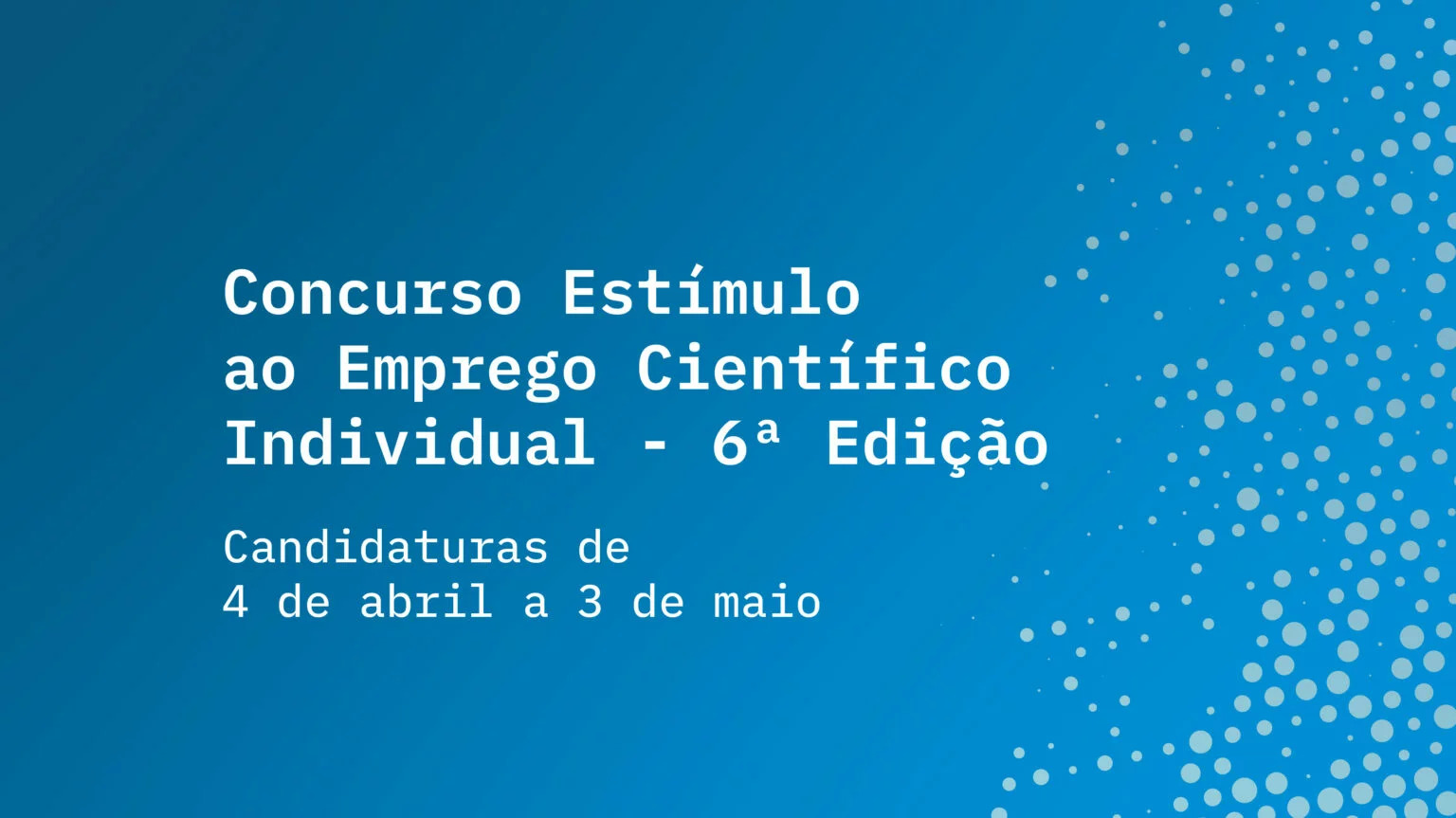Concurso Estímulo ao Emprego Científico – 6.ª Edição
Candidaturas de 4 de Abril a 3 de Maio de 2023
The Individual Scientific Employment Stimulus is an annual call for applications that directly supports the hiring of researchers, in all scientific areas, who intend to carry out their scientific research in Portugal, in the institutions that are part of the National Science and Technology System (SNCT).
The Individual Call for the Scientific Employment Stimulus is aimed at PhD holders of any nationality or stateless with a background in any scientific area.
Applicants should indicate the host institution where they will develop their research plan. The selected doctorates are directly hired by the identified host institution, through FCT funding.
The following reference levels are considered:
Junior Researcher: PhD holders for 5 or less years, with limited post-doctoral research experience in the scientific area of the application.
Assistant Researcher: PhD holders for over 5 years and up to 12 years, with relevant curriculum in the scientific area of the application, and with limited scientific independence.
Principal Researcher: PhD holders for over 12 years with relevant curriculum in the scientific area of the application, demonstrating some scientific independence for the last 3 years.
We ask all Researchers who would like to have the Centre for Comparative Studies as a host institution to express their interest by sending us the following elements:
• Summarized curriculum vitae;
• Brief description of the work plan to be submitted, keeping in mind CEComp’s scientific profile.
We recommend special attention to the main lines of research developed at the CEComp, within the scope of its four groups, so that the work plans presented clearly demonstrate their suitability for the scientific profile of this centre.
The proposals received will be considered by CEComp’s Board of Directors.
These documents should be sent by email to projectos.cec@letras.ulisboa.pt until April 3rd 2023.
CECOMP’S MAIN LINES OF RESEARCH
MORPHE researches memory in its relationship with tradition, emotions and textuality, aiming to contribute to the debate of how individual, collective and cultural identities are formed and transformed. It is organised into research subgroups working on the following topics: World Literature, promoting a non-Eurocentric conception of European literatures; late medieval and early modern Portuguese literature; the concept of the posthuman, with a critical awareness of the limits of traditional anthropocentric and humanistic assumptions; memory and emotion, emphasising contemporary artistic representations of trauma and migration; 20th century Portuguese literature, focusing on education, editions and reeditions of literary texts, and studying the presence of Portuguese authors in textbooks and syllabi; gender and sexuality, especially in African literature in Portuguese.
LOCUS examines ideas of space, place, landscape and borders, organising its activities in 4 research subgroups: 1. DIIA: IBERIAN AND IBERO-AMERICAN DIALOGUES which conducts in-depth research into the relationships between literatures in Portuguese and other Iberian languages produced in Europe and the Americas and delves into cultural and artistic interactions taking place in the Iberian and Ibero-American contexts; 2. MOV: MOVING BODIES: CIRCULATIONS, NARRATIVES AND ARCHIVES IN TRANSLATION which gives voice to transnational agents, considering micro and macro-histories of translation; 3. ORION – PORTUGUESE ORIENTALISM which promotes a continuous discussion around Portuguese orientalism; 4. TRAVEL AND UTOPIA discusses problems in utopian studies and develops research on contemporary and problematic utopias; it examines the problematization of travel writing, the destabilisation of utopian narratives and the contemporary idealisation of utopia/dystopia.
CITCOM addresses issues related with contemporary societies, which are formulated in relation to crossed modernities, (trans)nationalisms, (post)colonialisms and glob/calisms, within which identities, memories and citizenship projects are institutionalised, negotiated and struggled over. It is also characterised by a broad and flexible epistemological and methodological approach to these themes, combining cultural, textual and visual analysis, with archival research, sociological and historiographical enquiry, ethnography and artistic practice, and focusing on a wide range of artifacts, processes and media, which include: written and edited text, film, photography, visual arts, soundscapes/phonographies, oral accounts, cultural practices or digital content, among others.
THELEME deals with interrelations between film, music, the visual arts and literature; with literary translation but also other media translation; with reuses of classical texts and imagery in contemporary art and media, and with specific thematic approaches to the arts and intermedial explorations, all framed within the overarching research line of the Centre for Comparative Studies — “Comparatism, Reflective Cosmopolitanism and Critical Global Studies”. The groups’ approach favours the field of Intermediality (first proposed by Hansen-Löve, 1983), which evolves from Interarts Studies and opens investigation to a broader set of practices, overcoming the divide between so called high and low culture.
